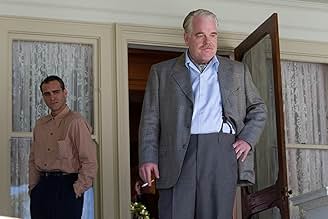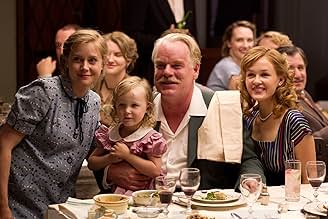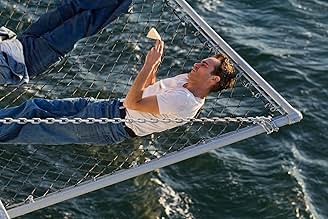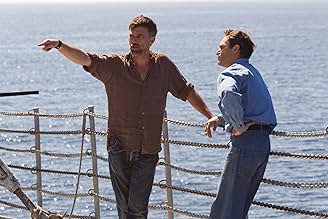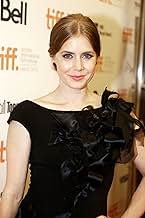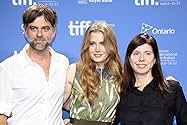Un veterano naval vuelve a casa después de la guerra, inestable e inseguro sobre su futuro. Es atraído hacia La Causa y su carismático líder.Un veterano naval vuelve a casa después de la guerra, inestable e inseguro sobre su futuro. Es atraído hacia La Causa y su carismático líder.Un veterano naval vuelve a casa después de la guerra, inestable e inseguro sobre su futuro. Es atraído hacia La Causa y su carismático líder.
- Nominado a 3 premios Óscar
- 75 premios ganados y 187 nominaciones en total
Patrick Wilder
- V.A. Patient
- (as Patrick Biggs)
- Dirección
- Guionista
- Todo el elenco y el equipo
- Producción, taquilla y más en IMDbPro
Argumento
¿Sabías que…?
- TriviaDuring the jail cell scene, Joaquin Phoenix breaks a real toilet. His actions were entirely improvised. Due to the historical past of the building where the scene took place, the toilet was considered "historical." Joaquin had no intentions to break the toilet, nor did he think it was possible.
- ErroresIn the "pacing" scene, as Quell goes from wooden paneled wall to window and back, the second time he goes to he wooden paneling, he breaks out a panel when he pounds it with rage. In the numerous successive shots, the wood panel is restored.
- Citas
Lancaster Dodd: If you figure a way to live without serving a master, any master, then let the rest of us know, will you? For you'd be the first person in the history of the world.
- Créditos curiososAfter its title, this film has no further opening credits.
- ConexionesEdited into Conspiracy: The Hollywood Syndicate (2015)
- Bandas sonorasBaton Sparks
From '48 Reponses to Polymorphia'
Written by Jonny Greenwood
Performed by The Aukso Chamber Orchestra
Courtesy of Unreliable Ltd.
Opinión destacada
Yes, herein contains some of the most ravishing filmmaking of the new millennium. The period details are abstract yet precise. The score has a stark, primordial allure. It's post-WWII America: Psychologically scarred veterans attempt to cramp themselves back into society. One is loner Freddie Quell, adrift in emotional confusion. He's secured a gig as a portrait photographer at a lavish department store imagined like a temple of indulgent commercialism. But Freddie doesn't last long there. In the darkroom, he screws models and chugs rotgut he makes with photo chemicals. Ultimately, he loses it on a customer, not just hitting him but harassing and lambasting him, working out some indecipherable, irrepressible rage.
Phoenix's performance as Freddie reduces all he's done before to a preparation exercise. He longs for something, but even he can't tell you what, and that sorrow has clotted into self- destructive ritual. We see his snarly face from angles we haven't seen before. We're not sure if his leery eyes are hateful or if he's dead inside. He's a captivating animal.
Then he meets stout, articulate Lancaster Dodd, always circled by people who treat him like a prodigy, hanging on his every word, laughing at all his mugging. Lancaster fancies himself a renaissance man. He's married to Peggy, who's much more vigilant than we first think. His son trails the proceedings with a dormant pose of derision. His daughter marries a man who, like everyone else in their clique, views him as a wizard.
The film belongs to Phoenix, but Hoffman more than does his thing, his affectations ringing with conceit and fraudulence. Freddie---father dead, mother institutionalized---is naturally drawn to Dodd, who promises answers, mental freedom, happiness, even claims to cure leukemia. He's written a book his bootlickers treat as a sort of bible. He loves to charm and perform.
It's well-known that Lancaster's cult is inspired by L. Ron Hubbard's Scientology. It's not direct, but the manner in which Lancaster draws Freddie into the fold, among other things, is unmistakably influenced by the contentious institution and Hubbard's life. Paul Thomas Anderson doesn't bind to that inspiration for his movie...but he doesn't bind to anything, really. You walk out muddled, wearied, wondering where to start in connecting the dots in this elegant, arresting movie. The story is as confounding as its technique is magnificent.
Anderson, the true wunderkind of the Tarantino generation, sets everything up so beautifully, you wait for the turning point to prevail so the intrigue can come to boil. Instead, nothing progresses. The dramatic developments seem to dwindle and become less consistent as the movie drifts along, and Anderson throws in pauses, like a lingering desert scene or an outstretched montage in which Freddie is made to pace in a room, that slow the movie to a drudge. Freddie's sex preoccupation, which was stressed in the film's early stretch, grows dissonant. It's less about narrative arc and more the emotional condition of two men, a twist of trust and mistrust, id and superego. PTA's vision is grand in scope, but his result is not so much ambiguous as opaque and detached.
For the first time in his immaculate career, the greatest filmmaker of his generation seems to languish. His newfound frigidness makes the film easy to admire but difficult to love. Anderson is so stunningly impressive, in fact, that it's taken me two viewings of The Master to admit all this to myself. Understandably, some critics have patronized it as deliberately evasive and occult, but isn't that just double-talk? A glorification of an artist's failure to proportionately bear his ideas? Something particularly intriguing is how the movie poses questions not so much about the importance of faith, but how far the human limit for change can extend and to confront emotional devastation so heavy it can never recover. But the film is too ambivalent or cautious to probe them in depth. By the end, it's become an opaque challenge between two phenomenal actors whose commitment to their roles is awe-inspiring, but it's manacled to a work so in awe of itself, the audience gets blockaded.
Phoenix's performance as Freddie reduces all he's done before to a preparation exercise. He longs for something, but even he can't tell you what, and that sorrow has clotted into self- destructive ritual. We see his snarly face from angles we haven't seen before. We're not sure if his leery eyes are hateful or if he's dead inside. He's a captivating animal.
Then he meets stout, articulate Lancaster Dodd, always circled by people who treat him like a prodigy, hanging on his every word, laughing at all his mugging. Lancaster fancies himself a renaissance man. He's married to Peggy, who's much more vigilant than we first think. His son trails the proceedings with a dormant pose of derision. His daughter marries a man who, like everyone else in their clique, views him as a wizard.
The film belongs to Phoenix, but Hoffman more than does his thing, his affectations ringing with conceit and fraudulence. Freddie---father dead, mother institutionalized---is naturally drawn to Dodd, who promises answers, mental freedom, happiness, even claims to cure leukemia. He's written a book his bootlickers treat as a sort of bible. He loves to charm and perform.
It's well-known that Lancaster's cult is inspired by L. Ron Hubbard's Scientology. It's not direct, but the manner in which Lancaster draws Freddie into the fold, among other things, is unmistakably influenced by the contentious institution and Hubbard's life. Paul Thomas Anderson doesn't bind to that inspiration for his movie...but he doesn't bind to anything, really. You walk out muddled, wearied, wondering where to start in connecting the dots in this elegant, arresting movie. The story is as confounding as its technique is magnificent.
Anderson, the true wunderkind of the Tarantino generation, sets everything up so beautifully, you wait for the turning point to prevail so the intrigue can come to boil. Instead, nothing progresses. The dramatic developments seem to dwindle and become less consistent as the movie drifts along, and Anderson throws in pauses, like a lingering desert scene or an outstretched montage in which Freddie is made to pace in a room, that slow the movie to a drudge. Freddie's sex preoccupation, which was stressed in the film's early stretch, grows dissonant. It's less about narrative arc and more the emotional condition of two men, a twist of trust and mistrust, id and superego. PTA's vision is grand in scope, but his result is not so much ambiguous as opaque and detached.
For the first time in his immaculate career, the greatest filmmaker of his generation seems to languish. His newfound frigidness makes the film easy to admire but difficult to love. Anderson is so stunningly impressive, in fact, that it's taken me two viewings of The Master to admit all this to myself. Understandably, some critics have patronized it as deliberately evasive and occult, but isn't that just double-talk? A glorification of an artist's failure to proportionately bear his ideas? Something particularly intriguing is how the movie poses questions not so much about the importance of faith, but how far the human limit for change can extend and to confront emotional devastation so heavy it can never recover. But the film is too ambivalent or cautious to probe them in depth. By the end, it's become an opaque challenge between two phenomenal actors whose commitment to their roles is awe-inspiring, but it's manacled to a work so in awe of itself, the audience gets blockaded.
- jzappa
- 6 oct 2012
- Enlace permanente
Selecciones populares
Inicia sesión para calificar y agrega a la lista de videos para obtener recomendaciones personalizadas
- How long is The Master?Con tecnología de Alexa
Detalles
- Fecha de lanzamiento
- País de origen
- Idiomas
- También se conoce como
- The Master
- Locaciones de filmación
- Mare Island, Vallejo, California, Estados Unidos(as Philadelphia, Pennsylvania and various houses, a park and the docks)
- Productoras
- Ver más créditos de la compañía en IMDbPro
Taquilla
- Presupuesto
- USD 32,000,000 (estimado)
- Total en EE. UU. y Canadá
- USD 16,377,274
- Fin de semana de estreno en EE. UU. y Canadá
- USD 736,311
- 16 sep 2012
- Total a nivel mundial
- USD 28,288,071
- Tiempo de ejecución2 horas 18 minutos
- Color
- Mezcla de sonido
- Relación de aspecto
- 1.85 : 1
Contribuir a esta página
Sugiere una edición o agrega el contenido que falta







